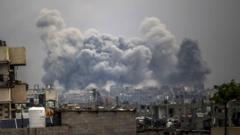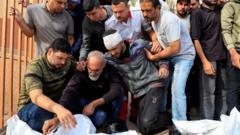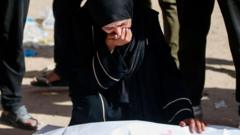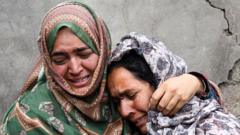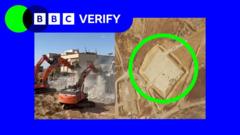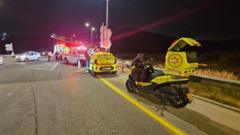As the Israeli blockade continues, Gazans face a severe humanitarian crisis marked by extreme hunger and malnutrition. Reports from children and families highlight desperate conditions, including a lack of food and medical supplies, while differing perspectives on the situation complicate the narrative.
Growing Hunger Crisis in Gaza Amid Ongoing Blockade
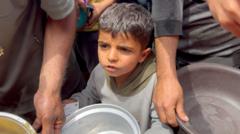
Growing Hunger Crisis in Gaza Amid Ongoing Blockade
Residents of Gaza report severe food shortages and worsening conditions due to the ongoing blockade, with alarming rates of malnutrition, particularly among children.
In the northern Gaza displacement camp, six-year-old Ismail Abu Odeh clung to hope as he fought for food, desperately appealing, "Give me some," only to return from a food distribution point empty-handed and crying after his bowl of lentils was knocked out of his grasp. This incident captures the dire state of food security for many families in Gaza, forced to endure hunger amidst ongoing military operations and an extensive blockade that has lasted more than 10 weeks.
As Israel intensifies its military actions, reports indicate that daily life for Gazans is becoming increasingly precarious. The United Nations has warned that the enclave faces a potential famine, yet the Israeli government insists there is no actual food shortage, alleging that Hamas is responsible for diverting aid meant for civilians.
Communication barriers exacerbate the situation, as Israel restricts media access to the region. Through phone calls and trusted local sources, journalists have gathered heartbreaking accounts of families struggling to find basic sustenance. One local food kitchen operator expressed that they are "operating day by day," emphasizing the uncertainty and desperation faced by Gazans.
Many residents report that limited items are available at disproportionate prices in the markets, further alienating those in need. A 23-year-old woman shared her troubling experiences of constant dizziness and fatigue from lack of nourishment, underscoring the broader health implications of the blockade.
Adham al-Batrawi, formerly from a prosperous neighborhood, described an alarming trend of improvisation to secure food. His efforts to create makeshift meals speak to a broader survival instinct among Gazans where hunger has morphed into a daily challenge.
Meanwhile, parents like Rewaa Mohsen report worrying conditions as they struggle to care for their young children amidst the chaos of bombardments. Living on the edge of safety, she describes the eerie normalization of violence for her daughters and her unyielding resolve to provide for them despite dwindling supplies.
Healthcare workers in Gaza conditionally speak out about the impediments to delivering care, citing the reduced capacity of hospitals and the risk posed by ongoing attacks. Still, nurses like Randa Saied persist in their roles, affirming their commitment to serve their communities despite the looming dangers.
While efforts to reroute humanitarian aid through private companies in the U.S. are being proposed, critics argue that it may exploit the situation rather than provide true relief. In stark contrast, Ismail's father encapsulates the struggles of countless families when he says, "My children go to sleep hungry," revealing the emotional toll of the crisis as parents grapple with their powerlessness to provide for their most basic needs amid the turmoil in Gaza.

